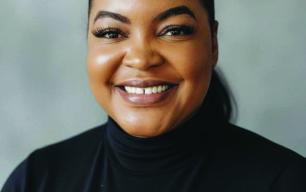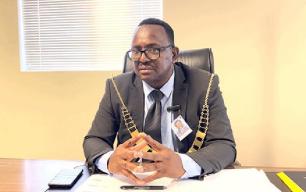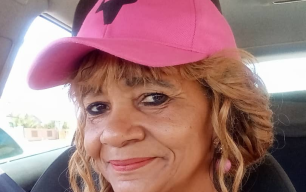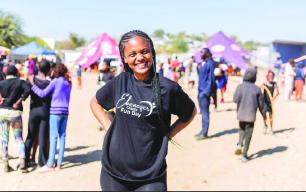Feris tackles GBV through ‘Victims-2-Survivors’

By Patience Makwele
Namibian Media and Information Literacy (MIL) expert DW Akademie project manager and cofounder of Victims 2 Survivors Lizette Feris has become a leading voice in the fight against gender-based violence (GBV) and child abuse through her organisation Victims-2-Survivors, while also pushing for systemic reforms to address what she describes as “a national crisis of generational trauma.”
Feris, who has worked in advocacy for more than a decade, believes that tackling abuse requires more than reactive interventions. Her approach combines direct survivor support with awareness campaigns, early childhood education, and policy advocacy.
“Every case is different and requires me to be mentally strong and available to the victim,” Feris said, explaining how she prepares herself before meeting survivors. “I must prepare mentally before engagements because I can never predict what someone will bring to the table. My role is to listen, not to collapse under the weight of their pain.”
One of the biggest obstacles, Feris said, is societal attitudes and manipulation, where even women at times silence other women. “There’s a narrative that women are happy as victims, which is used to justify silence and inaction. That manipulation needs to be challenged if we are serious about addressing GBV.”
Her advocacy has occasionally involved confronting public figures. She reflected on her engagement with comedian and puppeteer Shebeleza, whose online puppet shows frequently portrayed women in demeaning ways. “I tagged him on Facebook to call out his content. At first he reacted aggressively, but later when he became a father to a daughter, he reached out and admitted I was right.”
According to Feris, his upbringing in a single-parent household shaped his view of women as submissive. “When he opened up about his background, I realized my advocacy had shifted his perspective. That was a moment when I saw change happen.”
Through Victims-2-Survivors, Feris provides a platform where survivors of GBV and child abuse can seek counselling and share experiences without fear of stigma. The organisation also runs educational outreach, focusing on awareness of early warning signs of abuse and community-based solutions.
Feris said gaps in the support system remain glaring. “We have clinics and hospitals where you will only find two social workers expected to attend to more than ten clients a day,” she explained. “They become overwhelmed with the emotions of each case, and in the end, even the professionals are burnt out. We need more social workers across government hospitals and institutions if we want to offer meaningful support.”
She has also called on the Ministry of Gender, Equality, Poverty Eradication and Social Welfare to move beyond conferences and instead implement cost-effective community programs. “Expensive conferences don’t touch lives. One-on-one engagements with survivors, affordable mental health programs, and more accessible psychological care are what we need.”
Feris strongly believes that addressing abuse must begin with children at an early age. Through her private Montessori early childhood education centre, she incorporates lessons on emotional intelligence and self-expression into daily learning.
“Child brain manipulation is becoming a huge issue,” she cautioned. “We need to teach our little ones while they are still young about right and wrong so they are not easily manipulated. If we address trauma early, we can break the cycle before it spreads to another generation.”
The centre, which recently secured a five-year registration renewal from the Ministry of Education, offers scholarships to children from local communities. It now caters for more than 50 children, focusing on hands-on learning, social interaction, and emotional development. Feris said she sees the programme as part of a long-term solution: “Generational trauma has affected millions of Namibians. If we can help children manage emotions early, the ripple effects can transform families and communities.”
Looking at Namibia’s broader fight against GBV, Feris pointed to three urgent reforms such as: Implementation of the childcare plan and a stronger mandate for the Ministry of Gender to respond swiftly to abuse cases. Expansion of mental health support, with more trained social workers and accessible counselling in public facilities. Cost-effective grassroots programmes that replace high-cost conferences with direct community engagement.
“Namibia must put mental health and psychological care at the forefront because everyone is hurting in the cycle of abuse.”
She further noted that financial stress remains a factor that drives many women into vulnerable positions. “Financially distressed women often become victims of GBV because they feel they have no options. We need to support women economically to reduce their vulnerability.”
Feris often refers to the well-known starfish story – where a child throws stranded starfish back into the ocean one by one, despite being told the effort is futile. “It may not be possible to save everyone, but for the one you do reach, it makes a difference. That is how we must approach GBV.”
Her advocacy has gained recognition locally and abroad, including an interview with the BBC. While she acknowledges the road ahead is long, Feris insists change is possible. “I’ve seen people shift – fathers becoming more conscious, comedians changing their content, survivors speaking out. Those moments show me that advocacy is not in vain.”
Feris said she will continue combining her work in education and advocacy to push for a Namibia free of GBV. “If we start with our children, support survivors, and fix our systems, we can end this cycle. Everyone has a role to play, from government to communities to families.”
Through her work with Victims-2-Survivors and her Montessori centre, Feris is determined to prove that with persistence and empathy, the fight against GBV is not only necessary but winnable.
- 487 views










Comments